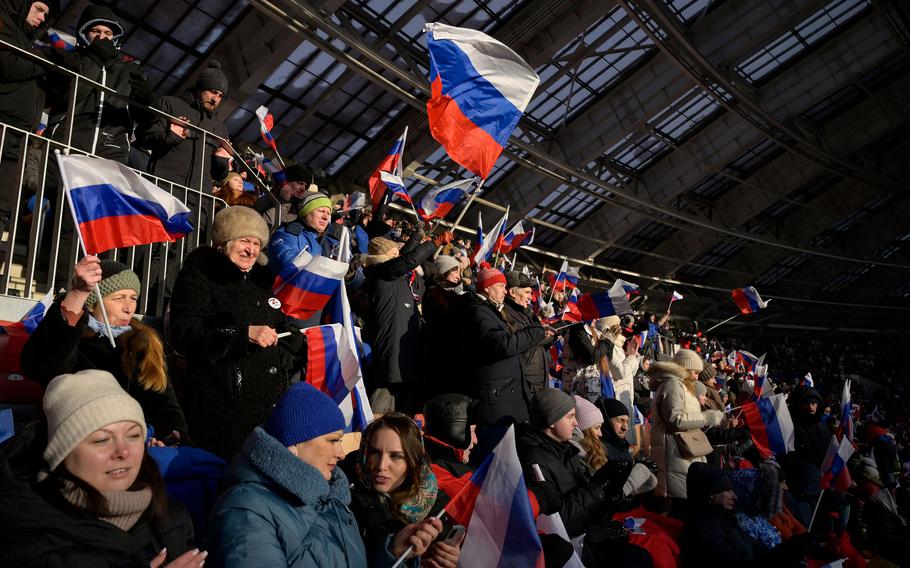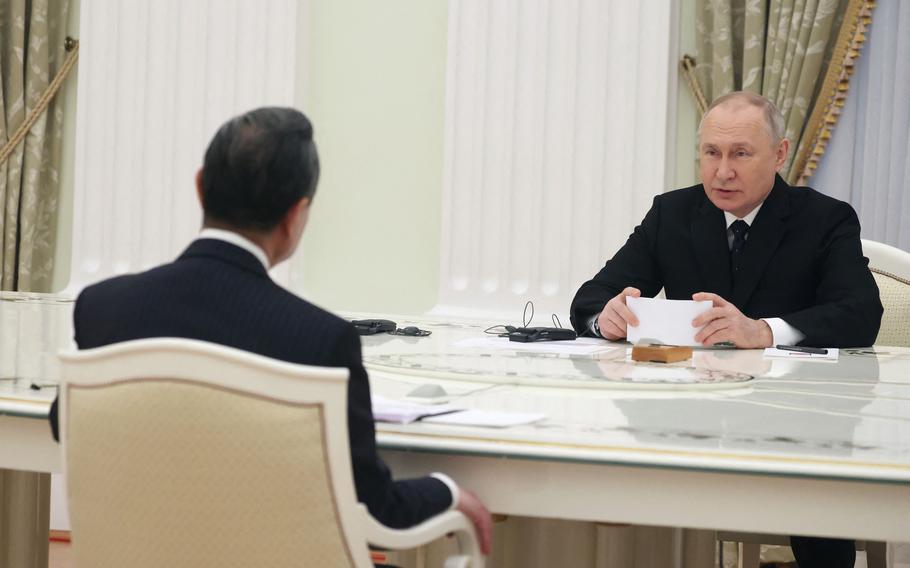
People attend a patriotic concert dedicated to the upcoming Defender of the Fatherland Day at the Luzhniki stadium in Moscow on Feb. 22, 2023. (Natalia Kolesnikova, AFP/Getty Images/TNS)
(Tribune News Service) — As Vladimir Putin’s invasion of Ukraine struggles into its second year, his transformation of Russian society is in overdrive.
The Russian leader has unleashed a wave of repression not seen since his KGB hero Yuri Andropov ruled, jailing citizens for the slightest hints of questioning of his official line, a mix of Russian imperial and Soviet nostalgia that has been rushed into curricula for schools and universities across the country. Artists, writers and actors have been hounded from their jobs for even suggesting critical views, their works and exhibits replaced by new ones scrubbed for adherence to the neo-Soviet “traditional values” Putin wrote into law. Schoolchildren denounce teachers and parishioners denounce priests for suggesting peace instead of war.
To shore up support, his government has doled out cash payments to citizens in the country’s impoverished regions and shut down the few remaining media outlets that challenged the official state version of events. In stage-managed events lavishly covered by the state media, Putin maintains the image that the war is far away, rarely referring to it directly, highlighting economic successes, new welfare benefits and renovated clinics. That was the message of his state-of-the-nation speech this week, which blamed the conflict on the US and its allies but offered no hint of when it might end. Instead, Putin offered new benefits to veterans and their families, touting the value of combat experience as the “best school of life.”
So far, the message is working. Even as the invasion has dragged on far longer than the few days that the Kremlin originally hoped and casualties have mounted into the tens of thousands, the majority of Russians say they are ready to keep fighting, according to independent polls. Only about a fifth of Russians want to bring a quick end to the war if that means admitting defeat, according to a Kremlin consultant.
Darya, a 36-year-old bookkeeper, said she was dead set against her husband’s plan to volunteer to fight when he first announced it shortly after the invasion last year, threatening to leave him if he did. Her husband, a veteran with combat experience, signed up anyway. By the time he came back on furlough in the summer, she’d changed her mind.
“Now I think my husband is a hero,” said Darya, asking that her last name and the provincial city she lives in not be used for fear of speaking openly to a US media outlet. “Men shouldn’t hide behind mother’s skirts when their country needs them,” she added. “When he comes back in March, we’re planning to pay off the mortgage” with his earnings, she said.
Around the country, Putin’s explanation that Russia is fighting not Ukraine but the entire “collective West,” a narrative adopted after a string of defeats at the hands of Kyiv’s forces, has resonated more than the initial claims the war was about removing the government in Kyiv, according to pollsters. The fact that the US and its allies aren’t actually fighting doesn’t shake that conviction.
The perceived strength of the support reinforces the Kremlin’s confidence that it can triumph in the conflict by outlasting Ukraine and its allies, even if that means tolerating much greater sacrifice, according to people close to the leadership.
Since he came to power in 2000, Putin has been remaking Russia to harden his control over society for just this kind of conflict, crushing potential threats to his power and eradicating opponents and dissenting views. Since he sent troops into Ukraine a year ago, that effort has accelerated exponentially. Staffers are already laying plans for his re-election campaign in 2024, which would keep him in power at least until 2030, the people said.
The Kremlin spent two decades forging the ‘Putin Majority’ — the tens of millions of Russians sure that the former KGB operative knows best — and is confident it’s still solid and ready for whatever he decides, the people said. That’s likely to be a war that may last years, but also could be a temporary truce to win time to gird for a new fight. At the same time, surveys show that anything that brings the war close to home for Russians — such as last year’s mobilization of 300,000 reservists — fuels alarm and support for a negotiated settlement.
The educated middle class in the country’s largest cities that had for decades been less antagonistic toward the West has been transformed or eradicated. Upwards of a million Russians, many of them young professionals, have left the country in the biggest exodus since the 1990s. Those in the elite once considered relative ‘liberals’ who’ve stayed are cowed into silence by fear of retribution or have embraced the Kremlin’s anti-western line.
Dmitry Medvedev, who as Putin’s hand-picked president from 2008-2012 embodied the hopes of the ‘liberal’ wing, has become one of the most outspoken hardliners, threatening nuclear war in social media posts. Within the Kremlin, his clout is growing, according to insiders, as Putin values his commitment. Senior officials now regularly attend meetings Medvedev calls, the people said. Putin has dispatched him to China, a key ally, and given him an expanded role in supervising military production.
What little public criticism of the official line is tolerated is limited mainly to hardliners calling for an even greater commitment to the war effort, with more strikes on civilian targets in Ukraine or even NATO.

Russian President Vladimir Putin meets with China’s Director of the Office of the Central Foreign Affairs Commission Wang Yi at the Kremlin in Moscow on Feb. 22, 2023. (Anton Novoderezhkin, SPUTNIK/AFP via Getty Images/TNS)
“For many, it’s become impossible to maintain a neutral position,” said Svetlana Erpyleva of the Public Sociology Laboratory, a group of researchers that’s conducted hundreds of anonymous interviews with Russians on their views on the war. “They feel the pressure of the environment and they choose support.”
The hardening of pro-war views has left the few Russians willing to speak out openly against it even more isolated.
Maria Ponomarenko, a 44-year-old activist from the Siberian city of Barnaul, was charged last year under the strict censorship law passed after the invasion for posting in Telegram about the deaths of Ukrainian civilians in Mariupol, a city besieged by Russian troops.
But after spending a few days under house arrest with her ex-husband and his family, she asked a court to send her back to jail because of the tension caused by their pro-war views. The judge initially refused, relenting only after another of their arguments over the invasion ended with her husband turning violent, according to Ponomarenko. Last week, she was sentenced to six years in prison.
“To prove my innocence, it’s enough to open the constitution and read,” she told the court in her closing remarks. “If there’s a war, call it a war,” she said. Censorship laws passed last year ban the use of that word for what Putin calls a “special military operation.”
His personalized rule has permeated to the lowest levels of the system. “Do you trust our commander-in-chief, President Putin?” was the prosecutor’s final question in her cross-examination of a Moscow student charged with posting “fakes” about the war in a Telegram channel. “No, I don’t trust Putin,” the 22-year-old said from the glass defendant’s cage. “That’s why I’m here.” He faces as much as nine years in prison if convicted.
After thousands were arrested, the sporadic protests seen at the beginning of the war have died out. Activist Ivan Zhdanov said opposition still boils beneath the surface, but is limited amid the crackdown to relatively minor acts like anti-war graffiti and hacking. Like many other allies of jailed opposition leader Alexey Navalny, Zhdanov left Russia before the invasion.
After polls showed a spike in public anxiety and support for talks to end the war in the wake of Putin’s Sept. 21 order mobilizing 300,000 reservists for the front, the Kremlin quickly resumed its efforts to shield the bulk of the population from the impact of the fighting. Pollsters say the public alarm passed quickly, but support remains largely passive.
Still, local actions in support of the troops are growing. While many are organized or encouraged by the authorities, many have been grassroots initiatives, from school PTA groups collecting tin cans to make “trench candles” to send to the front lines to women’s groups crocheting camouflage mesh for the military.
Across Russia, citizens are turning others in for even the subtlest hint of questioning the war.
In the southern city of Krasnodar, a court last summer fined a local resident for posting in the WhatsApp chat for residents of his apartment building about the memoirs of a Soviet World War II veteran recounting abuses by troops against German civilians after the fall of Berlin. A neighbor turned him in to police, who charged him under a new law banning criticism of the Red Army’s role in the war. Putin has sought to draw parallels to that struggle in marshalling support for his Ukraine invasion.
“Every supporter of the war watches TV, this propaganda is indeed a weapon of mass destruction,” said defense lawyer Alexey Avanesyan.
Russians show a growing demand for more repressive measures against those seen as traitors and critics, according to the Kremlin consultant. The authorities have been quick to respond. Though still far less sweeping than those seen in the Soviet era, the wartime crackdown has seen more than 400 people prosecuted for actions deemed protests or violations of the new censorship laws, according to the OVD-Info monitoring group.
Earlier this month, after the Ministry of Culture, responding to a complaint from a visitor, opened a formal probe into whether Moscow’s Tretyakov Art Gallery was observing Putin’s “traditional values” in its exhibits, the respected director was ousted.
Legislators are considering plans to strip critics who’ve left the country of their property and citizenship, penalties last applied in the Soviet era. Another draft law would require the use of literary Russian language in an effort to “protect Russian from the excessive use of foreign words.”
“The Kremlin is cobbling together a new imperial identity for Russian society from feelings of hurt, resentment, insecurity and paranoid purging of ‘traitors’ and ‘foreign agents,’” said Maxim Krupsky, a lawyer who defended activists and others caught up in the government’s steadily growing campaign to brand opponents under that title.
Putin has put special focus on ensuring his revanchist vision of Russia’s history and mission is reflected in textbooks and the education system. A new volume to be required for university students highlights the tradition of a strong hand in Russia through the centuries, including the current one. And last week, the Kremlin allocated 18.6 billion rubles ($250 million) for a new network of “patriotic” summer camps for children. Special school lessons highlighting the Kremlin’s claim that Russia has been fighting western encroachment for centuries will be expanded to include parents.
“If the current political system remains with the existing leaders for another 10 years or so, that’s a full school cycle for indoctrination,” said Ekaterina Schulmann, a Russian political scientist now based in Berlin. “And not so much in patriotism and this expansionist nonsense but in hypocrisy and getting used to lies.”
©2023 Bloomberg L.P.
Visit bloomberg.com.
Distributed by Tribune Content Agency, LLC.